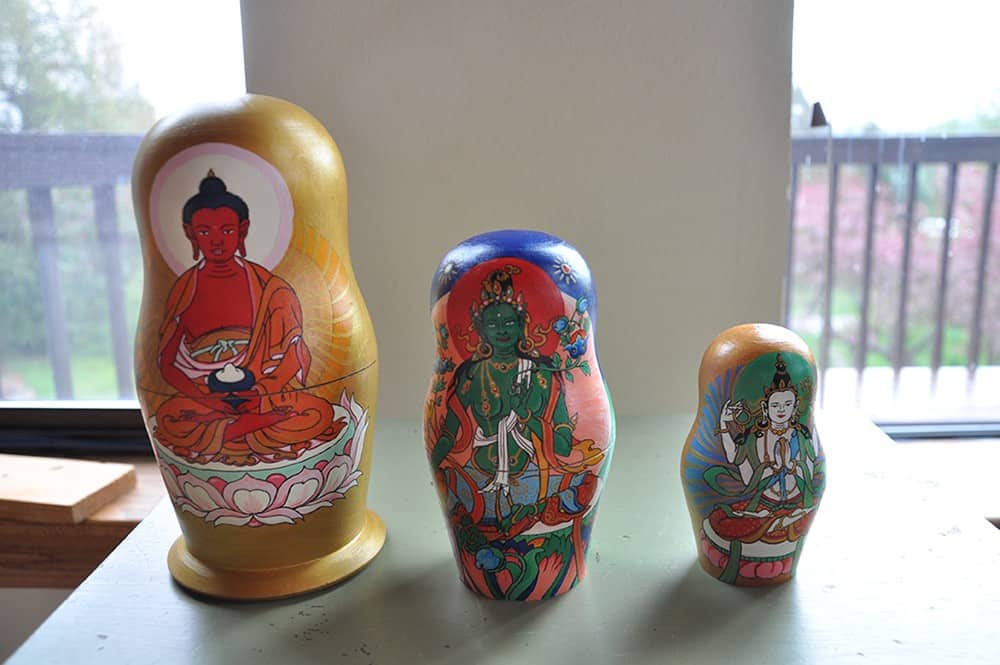Gomchen Lamrim review: Exchanging self for others
Gomchen Lamrim review: Exchanging self for others
Part of a series of teachings on the Gomchen Lamrim by Gomchen Ngawang Drakpa. Visit Gomchen Lamrim Study Guide for a full list of contemplation points for the series.
- Self-grasping ignorance versus self-centered thought
- Meditation on the disadvantages of self-centeredness
- Meditation on the benefits of cherishing others
- Taking and giving meditation
Gomchen Lamrim review: Exchanging self for others (download)
Contemplation points
Self-centered attitude
Investigate the self-centered attitude using examples from your own life.
- We often think we’re all equal… but “I’m more important.” Look at that self-centered attitude. Is it realistic? Is it beneficial?
- Is this attitude your friend? Has it caused you harm? Has your self-centered attitude made you harm others?
- It is the basis of all our fear and makes up stories about how others can harm us in the future. It causes us to suffer from fear. Have you found this true in your life?
- Consider: All of the problems that we currently face are the result of our self-centered attitude. Blame the self-centered mind. There is no reason to blame others. (Be sure to keep in mind that we are NOT our self-centered attitude. It’s just an attitude that clouds the pure nature of our mind).
Cherishing others
Consider some of the benefits of cherishing others.
- The more we consider the advantages of cherishing others, the easier it becomes to open our heart to them and care for them in a genuine way. We care for them simply because they exist, not because they do something for ME.
- When we hold in our hearts the thought that cherishes others, what we say and do will make others happy. This attitude creates the causes for happiness for self and others.
- We respect and value others and our lives become meaningful because we act in ways that benefit others. This attitude propels us along the path to Buddhahood.
- Cherishing others pulls us out of our self-centered ways that make us so miserable.
- When we really care for others equally, we can be happy anywhere at any time.
- When we have the attitude that cherishes others, our relationships are better and it increases harmony.
- The heart that cherishes others is the root of all past, present, and future happiness for ourselves and others.
- Resolve to let the mind that cherishes others influence your life and those around you. This will make the world a better place.
Taking and giving
- Pick someone or a group of beings, maybe even beings in the hell realm. Take from them the very things you don’t want, the very things that make them suffer. Visualize them – really think about what it is like to be them. Be as specific as possible.
- Now let compassion arise. Imagine that their suffering leaves them in the form of pollution, black light, whatever works for you. Take it into yourself. Welcome it so that they can be free of suffering.
- Using your imagination, turn it into whatever helps you destroy your self-centered thought, like a dark mass at your heart which is your own disturbing attitudes and self-centeredness. It blows your self-centeredness up. All that is left is an incredible open space, freedom. Now stay in that space.
- Allow your love to arise. Think how wonderful it is that others are free of their suffering.
- Now imagine a brilliant white light coming from your heart. You send it out towards them. Transform and multiply your body, possessions and merit into whatever they need in this life and whatever will lead them on the path to awakening (teacher, teachings, all the conducive circumstances to produce realizations). Imagine that they become Buddhas.
- Take on the responsibility to eliminate all suffering and give happiness to all beings. This is the great resolve. This is the bodhicitta that allows us to achieve the skillful means that helps us work for the benefit of all beings. Resolve to never give up this intention.
Venerable Thubten Tsultrim
Inspired by Kwan Yin, Chinese expression of the Buddha Compassion, Ven. Thubten Tsultrim began to explore Buddhism in 2009. As she learned that "real people like me" aspired to become awakened like Kwan Yin, she began to explore the potential to becoming a monastic, which led her to Sravasti Abbey. She first visited the Abbey in May, 2011. Ven. Tsultrim took refuge and joined the 2011 Exploring Monastic Life program, which inspired her to remain at Sravasti Abbey where she continues to learn and grow in the Dharma. The future Ven. Tsultrim took anagarika ordination in October of that year. On September 6, 2012, she received both the novice and training ordinations (sramanerika and siksamana) and became Ven. Thubten Tsultrim ("Ethical Conduct of the Buddha's Doctrine"). Ven. Tsultrim was born in New England and spent 20 years in the U.S. Navy. She began her career doing maintenance on aircraft, then worked as an Air Traffic Controller before retiring as a Damage Control Chief Petty Officer. She has also worked as a staff member at a residential treatment center for teenage girls. At the Abbey, she is responsible for maintaining the buildings and provides support for the abundant audio teachings that the Abbey generates and shares.

